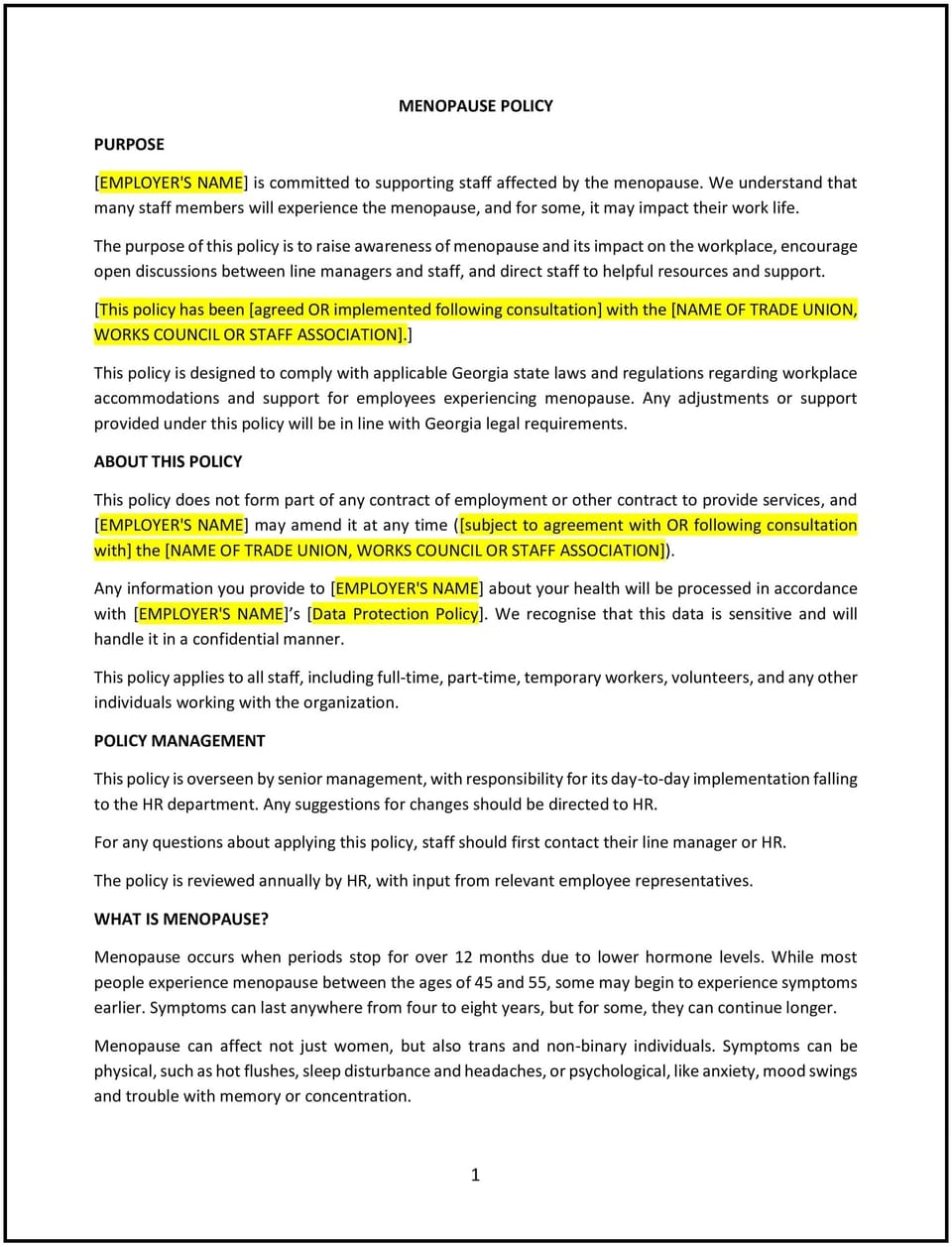Menopause policy (Georgia): Free template

Menopause policy (Georgia)
This menopause policy is designed to help Georgia businesses support employees experiencing menopause by creating a workplace that acknowledges their needs and promotes well-being. The policy outlines accommodations, support measures, and education to foster an inclusive and understanding work environment.
By implementing this policy, businesses can enhance employee satisfaction, promote equity, and reduce workplace stigma around menopause.
How to use this menopause policy (Georgia)
- Provide education: Offer training and resources to managers and employees about menopause, its symptoms, and its impact on work.
- Create a supportive environment: Encourage open communication and understanding about menopause-related challenges in the workplace.
- Offer reasonable accommodations: Provide flexibility, such as adjusted work hours, access to rest areas, or temperature-controlled workspaces, to support affected employees.
- Address health needs: Ensure employees have access to health resources, such as employee assistance programs (EAPs) or referrals to healthcare providers.
- Establish confidentiality: Maintain discretion when employees discuss menopause-related concerns or request accommodations.
- Monitor workplace policies: Review existing policies, such as absence or flexible work policies, to ensure they address menopause-related needs.
- Encourage feedback: Create opportunities for employees to provide input on how the workplace can better support their needs.
- Review and update regularly: Periodically assess the policy to reflect changes in workplace needs, employee feedback, or best practices relevant to Georgia businesses.
Benefits of using this menopause policy (Georgia)
Implementing this policy provides several advantages for Georgia businesses:
- Enhances employee well-being: Supporting employees through menopause helps them feel valued and understood.
- Promotes inclusivity: Acknowledging menopause-related challenges fosters a diverse and equitable workplace.
- Reduces absenteeism: Reasonable accommodations can help employees manage symptoms while maintaining productivity.
- Improves morale: A supportive workplace culture boosts employee satisfaction and loyalty.
- Reflects Georgia-specific values: Tailoring the policy to local workplace norms ensures its relevance and effectiveness.
Tips for using this menopause policy (Georgia)
- Promote awareness: Share information about menopause through workshops, newsletters, or internal communications.
- Provide flexible options: Allow employees to adjust their schedules or work remotely when symptoms interfere with their routine.
- Create supportive spaces: Ensure employees have access to rest areas, hydration stations, and temperature-controlled environments.
- Train managers: Equip managers with the knowledge and skills to have empathetic and supportive conversations with affected employees.
- Monitor effectiveness: Regularly review the policy’s impact and make adjustments based on employee feedback or workplace changes.
Q: What accommodations can businesses provide for employees experiencing menopause?
A: Businesses should consider flexible work hours, access to rest areas, temperature control, and other adjustments to help employees manage symptoms.
Q: How can managers support employees going through menopause?
A: Managers should receive training on menopause awareness, encourage open communication, and provide appropriate accommodations without judgment.
Q: Are employees required to disclose menopause-related issues?
A: No, disclosure is voluntary, but businesses should create an environment where employees feel comfortable sharing concerns if they choose to.
Q: What resources can businesses provide to support employees?
A: Businesses can offer EAPs, access to healthcare referrals, and educational materials to help employees manage menopause symptoms.
Q: How can businesses reduce stigma around menopause in the workplace?
A: Providing education, fostering open conversations, and normalizing discussions about menopause can help reduce stigma.
Q: How often should this policy be reviewed?
A: The policy should be reviewed annually or as needed to address workplace feedback or changes in Georgia business practices.
This article contains general legal information and does not contain legal advice. Cobrief is not a law firm or a substitute for an attorney or law firm. The law is complex and changes often. For legal advice, please ask a lawyer.


